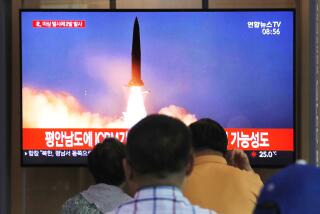Give Pakistan a Reason for Restraint
- Share via
In the aftermath of India’s five nuclear tests, world opinion is virtually unanimous that Pakistan should exercise restraint. But what reasonable options does the world, particularly the United States, offer Pakistan for its security in return for maintaining such restraint?
The Clinton administration must develop a new vision for South Asian security with provisions based on a strategic shield of superpower defense systems much as the U.S. provides NATO members and Japan and not on resumption of Cold War levels in conventional military armaments and revocable economic aid.
The need for such a security arrangement is compelling because while Pakistani nuclear tests may rebalance the overall (nuclear plus conventional) regional security equation with India, crossing the weapons threshold in Islamabad and New Delhi may yet deeply disturb the delicate global equilibrium achieved for the rest of the world’s current and aspirant nuclear states. The incentive for Iran to go nuclear, for example, would intensify greatly after a Pakistani test.
Pakistan’s security could be enhanced in part by Western powers guaranteeing that India be given no favorable treatment, such as relaxation of licenses for technology, under provisions of global test ban or nonproliferation treaties, should India sign on in the aftermath of its tests.
Another component of the security arrangement might include the U.S. initially assisting Pakistan with technological and logistical support to set up sophisticated surveillance systems. For example, ground monitoring facilities could coordinate with geosynchronous satellites scanning microwave traffic over South Asia. Low orbit optical imaging satellites could constantly survey known nuclear weapons sites. Longer term, such early warning systems could be buttressed by a defensive anti-missile capability to counter potential attacks.
To make such a proposal palatable for Islamabad’s rightly skeptical political and military circles, such facilities could be operated by joint American and Pakistani units under modified provisions of the International Military Exchange and Training program. The initial costs of such an operation could come from what would have been spent for the other forms of aid that the U.S. was prepared to offer in exchange for Islamabad’s no-test commitment.
America not only would benefit by entering the region as a nuclear stabilizer, but also would be able to build a platform for providing political support to Pakistan in its efforts to finally resolve the Kashmir dispute and bring peace to Afghanistan. Afghan stability would enable access routes for Central Asian oil and gas to be opened for transport to the Indian Ocean. Resolving Kashmir would allow for dramatic reductions in regional military spending.
One could imagine an undemonstrated but nuclear-capable Pakistan as South Asia’s hub of energy development, with Exxon refineries, Unocal pipelines and Shell distributors rather than a tragically depressed nation of underfed, illiterate and religiously zealous people hovering under an umbrella of nuclear bombs.
Only with America’s impenetrable technological support and President Clinton’s moral courage to act decisively can the world be assured of adequate security for more than one-quarter of humanity.
More to Read
Sign up for Essential California
The most important California stories and recommendations in your inbox every morning.
You may occasionally receive promotional content from the Los Angeles Times.













